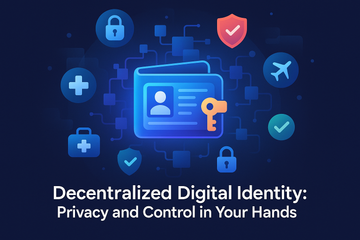You know what’s funny? We spend more time online than ever, streaming, scrolling, and—ironically—handing out pieces of ourselves to companies that promise to “keep them safe.” But ask the seasoned crypto crowd or any privacy realist, and they’ll gripe about passwords, hacks, and the tangle of online credentials we juggle. That’s where the idea of decentralized digital identity strolls onto the stage, looking to flip the script and return power to the people.
Wait, Who’s Got My Identity?
Let’s be honest. Traditional digital identity feels like trusting all your keys to one landlord—and then hoping he locks the door. Centralized authorities (banks, social networks, government bodies) sit on treasure troves of our private data. It’s quick, sometimes convenient, but one breach and, well, good luck chasing your info across the dark corners of the internet. Remember those Facebook leaks or the endless parade of exposed usernames and emails? Most folks barely bat an eye, but the risk is real.
Flipping the Power Dynamic: The Basics of Decentralized Identity
Decentralized digital identity is more than a buzzword. It shifts the keys, so to speak, from institutional vaults into our own hands. Imagine holding a single digital passport—made up of unique, verifiable data—that you show only when needed and just the precise bits relevant to the moment.
This ecosystem leans on:
- Decentralized Identifiers (DIDs): Unique numbers—like digital license plates—owned and managed entirely by you.
- Verifiable Credentials (VCs): Think of these as tamper-proof certificates (for jobs, university degrees, even concert tickets) cryptographically signed by trusted groups.
- Digital Wallets: Not just for crypto anymore! These wallets hold your credentials and let you present them without relying on a single gatekeeper.
The kicker? Stuff like blockchain and distributed ledger technology (DLT) keeps all this running, ensuring changes are nearly impossible to fake and no solitary overseer calls the shots (Okta, Identity.com).
Digging Deeper: How Does It Actually Work?
Let me explain with a practical twist. Let’s say your university wants to hand you a digital diploma. In the old world, they (the university) store, verify, and release copies if needed. In the decentralized world, they issue a verifiable credential, cryptographically signing it and popping it straight into your digital wallet. That’s it! When a potential employer wants to check up on your credentials, you show them the proof from your wallet. The employer can independently verify it’s legit—no need to fumble with slow third parties or third-party databases.
Sound Secure? That’s the Intention
Identity theft gets a lot harder when you’re not storing personal info in a single, juicy honeypot for hackers. Even if someone finagles their way into one system, they won’t have the keys to your kingdom. Each piece of data stays with the user, and you can reveal just what you want when you want—no more, no less.
Crypto Hardware Wallets: The Sidekicks Everyone Needs
So, where do big names like Trezor and Ledger come in? Folks have started using these devices to hold cryptographic keys for more than just their Bitcoin. Think about storing everything from proof of residency to vaccination records, all secured with the robust tech (and reputation) of established hardware wallet brands. That’s not just a nice-to-have—it’s reassurance built from years of crypto battle-testing.
It’s Not Only for Geeks and Whales
If you’re picturing a future reserved for computer scientists or early crypto adopters, think again. We’re seeing decentralized ID solutions pilot in sectors like healthcare (where data sensitivity is paramount), travel (for seamless cross-border verification), and even Web3 communities needing secure, privacy-respecting user logins.
Major Perks—and Some Nuances
- Privacy Up Front: Only share what’s needed, when it’s needed, with zero oversharing (think bouncers only seeing your age, not your address).
- User Control: If you lose your digital wallet, it’s not game over—you have ways to recover or back up, just like in the world of crypto hardware wallets.
- Interoperability: Credentials play well across platforms, with standards like those from the W3C paving the way.
- Reduced Fraud: Real-time cryptographic proof slams the window shut on forgers and impersonators.
Yet, truth be told, this isn’t a silver bullet. Decentralized digital identity systems, for all their promise, need mass adoption to shine. It’s easy to dream about a world where your medical records, work history, and club memberships fit neatly into a single app. The reality? Some institutions cling to legacy systems, and interoperability still hits the occasional speed bump.
Culture Shift: Why Now?
Why are we even talking about this as if it’s a revolution? Well, the digital zeitgeist is veering hard toward autonomy, privacy, and self-custody. It’s not just a tech upgrade—it’s a response to real consumer fatigue with passwords, phishing, and being treated as data products. Younger generations grew up with the notion of digital rights. Now, even regulatory outfits in the EU and elsewhere are nudging toward decentralization for trust and privacy’s sake (walt.id).
Looking Ahead (and Doubling Back)
Sure, no system is flawless. There are trade-offs. Managing your own credentials comes with responsibility, and some may find that daunting, like switching from automatic to manual cars. But, as with crypto wallets, the learning curve pays off in peace of mind and flexibility.
Increasingly, forward-thinking brands, countries, and communities are piloting wallet-centric identity systems. With established players like Ledger and Trezor putting their muscle behind secure key management, the road to decentralized ID could end up being as smooth as your latest crypto transaction—well, on a good day.
You don’t have to be a web3 maximalist to appreciate what’s at stake: more privacy, more control, and less dependency on corporations that treat your identity as just another asset. Maybe that, more than any shiny tech, is why decentralized digital identity feels inevitable. Or maybe you just want to keep your secrets—well, secret. Either way, it’s a refreshing twist in the saga of online life.











